

How Can Neuroscience Inform Online Adult Education? How Can Neuroscience Inform Online Adult Education?
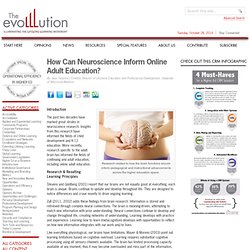
Research related to how the brain functions should inform pedagogical and instructional advancements across the higher education space. Introduction The past two decades have marked great strides in neuroscience research. Insights from this research have informed the fields of child development and K-12 education. More recently, research specific to the adult brain has informed the fields of continuing and adult education, including online adult education. Udacity - Climb Higher - Skills to change your life.
Noodle Partners. Hack Education. Fast Facts. The primary purpose of the Fast Facts website is to provide users with concise information on a range of educational issues, from early childhood to adult learning.
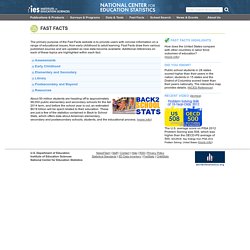
Fast Facts draw from various published sources and are updated as new data become available. Coursera Blog. European Higher Education Area website 2010-2020. NCAT Homepage. Institute-wide Task Force on the Future of MIT Education. Essay on making the switch from professor to coach. Popular culture images of teaching would have us believe that the very best college professors speak from the front of a large lecture hall filled with eager young students listening to every word we utter.
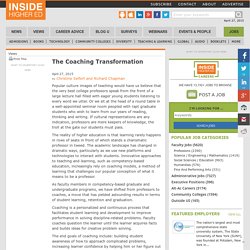
Or we sit at the head of a round table in a well-appointed seminar room peopled with rapt graduate students who wish to learn from our years of reading, thinking and writing. If cultural representations are any indication, professors are mere keepers of knowledge, the troll at the gate our students must pass. The Future of College: It’s Online. Universities as we know them began nearly a millennium ago as elite institutions that admitted only a few students from privileged families.
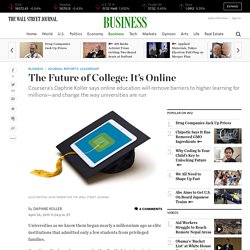
Over time, the doors have opened wider, first helping give rise to a middle class, and more recently to increasing numbers of women and minorities. Yet college today remains an experience not available to everyone who needs it—largely due to boundaries set by cost, time and space. Technology is changing that. The growth of the Internet and spread of mobile networking devices have untethered education in ways that are eliminating geographic and other physical barriers to a top-quality education. Using Disruptive Innovation To Improve Schools. 21st Century Smart: Staying Relevant In The Artificial Intelligence Age. Is College Worth It? That Depends. Prior Learning Assessment Statewide in PA's Community Colleges.
Prior Learning Assessment Statewide in PA's Community Colleges Posted on Wed, Feb 25, 2015 Allows non-traditional students to gain college credit for knowledge, work experiences.
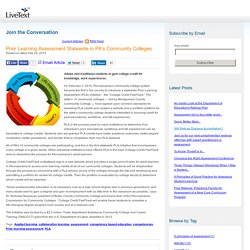
On February 2, 2015, Pennsylvania’s community college system became the first in the country to introduce a statewide Prior Learning Assessment (PLA) initiative – the “College Credit FastTrack.” The state’s 14 community colleges — led by Montgomery County Community College — have agreed upon common standards for awarding PLA credits and created a website and e-portfolio platform for the state’s community college students interested in pursuing credit for past educational, workforce, and life experiences. College presidents predict new institutional models.
Presidents say these new models could be the future of all colleges and universities in the next decade.
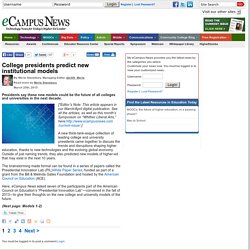
[*Editor’s Note: This article appears in our March/April digital publication. Book ‘Teaching in a Digital Age’ now ready and available. Click image to view the book For the last two weeks I have been frantically re-editing my online open textbook, ‘Teaching in a Digital Age.’
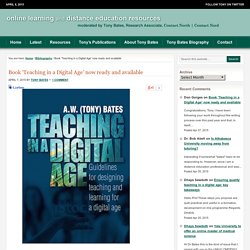
I am relieved and pleased to announce that the book is now finished – or at least as finished as an open online textbook will be, as it’s possible, indeed essential, to continue to add or remove materials to keep it up to date. So if you get the chance, log in to the book, have a look at it, and, if you can find the time, send me your comments. The target group The audience I am reaching out for are primarily: college and university instructors anxious to improve their teaching or facing major challenges in the classroom,school teachers, particularly in secondary or high schools anxious to ensure their students are ready for either post-secondary education or a rapidly changing and highly uncertain job market. Next: The Informal Future of Higher Education. Over the next 15 years, I anticipate that we will see fewer people attending bricks-and-mortar colleges and universities, and more people will seek out informal learning opportunities, especially as education is delivered through digital platforms.
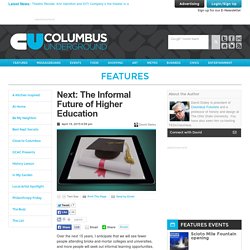
Megan Husted has recently written a piece for the New York Times titled “The Church of TED.” TED, with its airy promises, sounds a lot like a secular religion. And while it’s not exactly fair to say that the conference series and web video function like an organized church, understanding the parallel structures is useful for conversations about faith — and how susceptible we humans remain. Promising Full College Credit, Arizona State University Offers Online Freshman Program. Arizona State University, one of the nation’s largest universities, is joining with edX, a nonprofit online venture founded by M.I.T. and Harvard, to offer an online freshman year that will be available worldwide with no admissions process and full university credit.
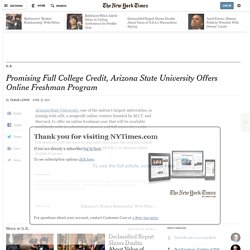
In the new Global Freshman Academy, each credit will cost $200, but students will not have to pay until they pass the courses, which will be offered on the edX platform as MOOCs, or Massive Open Online Courses. “Leave your G.P.A., your SATs, your recommendations at home,” said Anant Agarwal, the chief executive of edX. Reimagine Freshman Year with the Global Freshman Academy. Today, I am proud to announce edX’s partnership with Arizona State University to create the Global Freshman Academy, a first-of-its-kind online learning program that offers a unique way to start your undergraduate education.
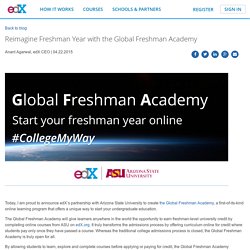
The Global Freshman Academy will give learners anywhere in the world the opportunity to earn freshman-level university credit by completing online courses from ASU on edX.org. It truly transforms the admissions process by offering curriculum online for credit where students pay only once they have passed a course. Can Games and Badges Motivate College Students to Learn?